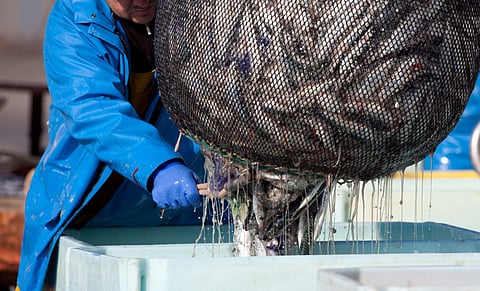

The iconic British cod is on the brink of collapse, while half of the UK's "top ten" fish stocks are either overfished or critically low.
That's the stark message of a new report released by Oceana today, analysing a total of 104 stocks utilised by the UK fishing industry.
According to the report, over a third of UK fish stocks are overfished, and around 25% have been reduced to "critically low population sizes".
In total, Oceana found that 45% of the 104 stocks were sustainably fished. However, of the 10 "key stocks" relied on by the UK fishing industry, defined as the stocks landed by British boats in the greatest volumes, 5 are either overfished, such as mackerel, or at a critically low population size, in the case of cod.
The ocean protection group is now calling on the UK government to take action to reduce catch limits.
"To prevent the collapse of these populations and safeguard ocean wildlife, coastal communities and the fishing industry itself, the government must urgently commit to setting all catch limits in line with the science," Oceana said in a statement.
Commenting on the report, Dr Annet Broderick, Professor of Marine Conservation at the University of Exeter, said it "clearly demonstrates the dire state of UK fish stocks. These exploited fish populations play an integral role in marine ecosystems, the health of the ocean and the future of the UK's fishing industry."
"The UK government must follow scientific guidance and set fishing quotas within the limits of sustainability," she added.
The Oceana report also considered the top five best (sustainably fished and healthy size) and worst (overfished and low size) managed stocks, noting that the International Council for the Exploration of the Sea (ICES) advises a complete ban on fishing for three of the five worst-managed stocks.
"These populations – Celtic Sea cod, West of Scotland cod and Irish Sea whiting – are frequently caught as bycatch when fishers are targeting other commercial species," Oceana said, noting the five "best-managed" stocks are low-value, low catch volume populations.
Current government catch limits are set higher than scientific advice, according to the report, which exacerbates the problem of overfishing and low population sizes. While the five best-managed stocks had catch limits in line with ICES guidance, four of the five worst-performing populations had catch limits far higher than advised to prevent population collapse.
